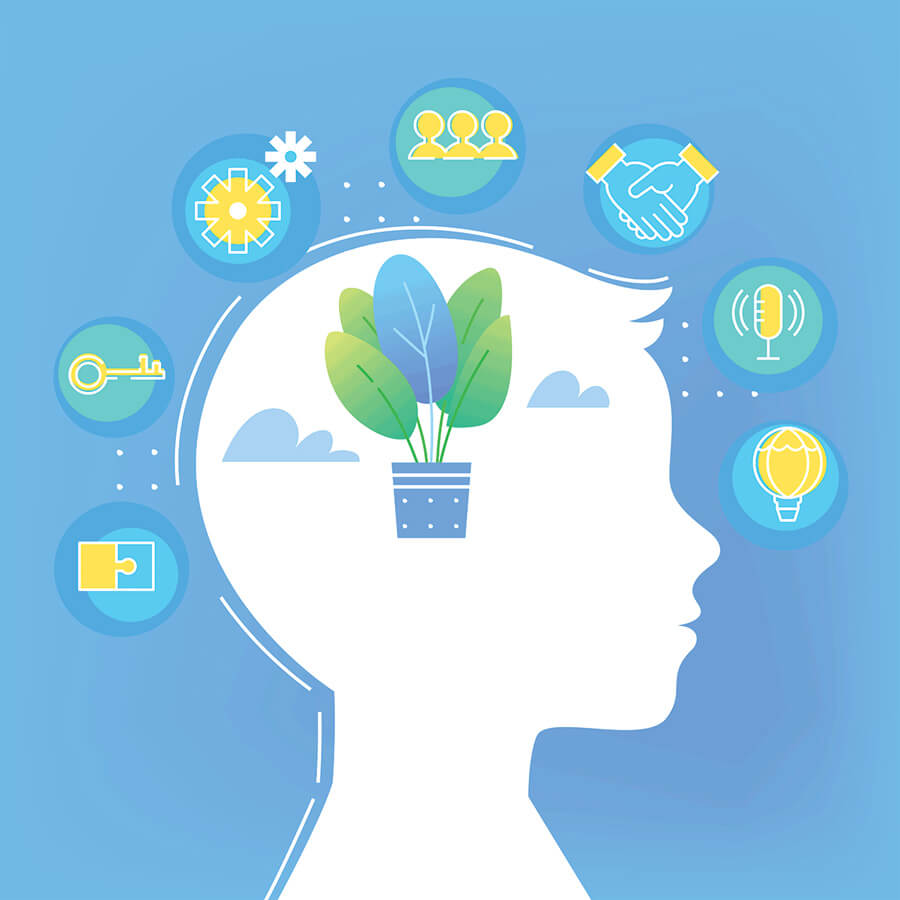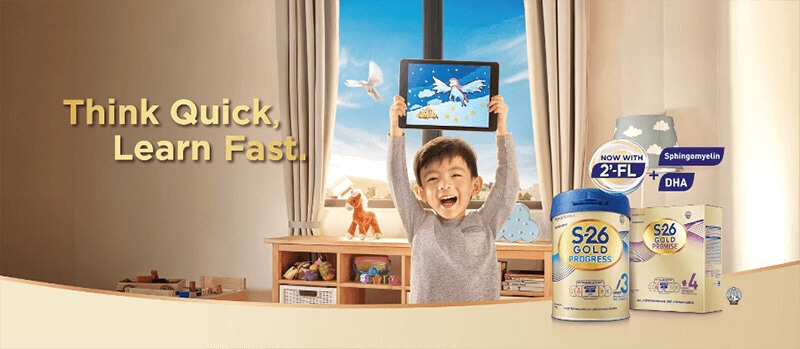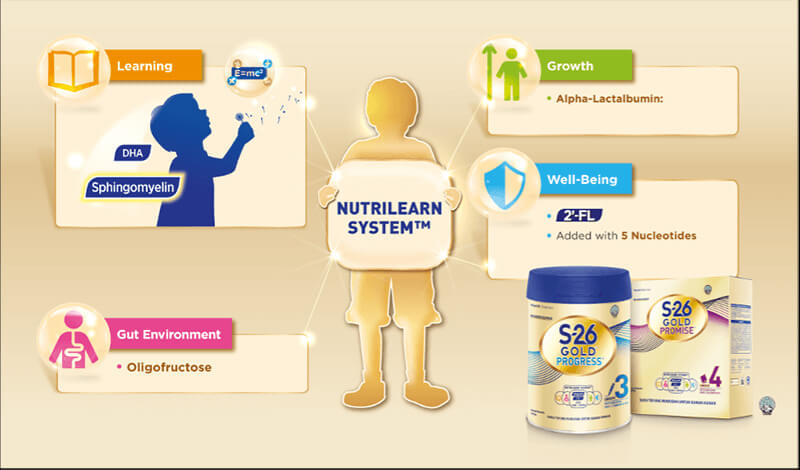Toddlers’ Brain Development: What Every Parent Should Know
Did you know that younger children can learn faster compared to adults? Yup, this is because during early childhood, at least one million new neural synapses (brain connections) are made every second1 - the highest amount in our entire lifetime! Toddlers go through little milestones every few weeks, which reflect the connections that are happening in their brain, and they happen really fast in the early years.

Here are some amazing brain facts for you:
- We are born with an average brain size that is about a quarter of the size of an average adult’s brain. The brain doubles up in size by the end of the first year. It continues to grow rapidly and reaches 80% of adult size by the age of 3 and 90% by the age of 5.2
- We are born with all the neurons (cells) needed in our entire lifetime but what makes the brain function are the connections between these cells.2
- Brain growth is stimulated by small muscle exercise.3 So always play with your little one’s fingers and toes!
The Importance of Brain Development in Toddlerhood
Toddlers develop brain connections through various everyday experiences such as interactions with parents, caregivers and siblings. Positive interactions, quality care and a healthy surrounding in the early years will benefit your child’s brain development and have a positive impact on his future health, success and overall well being.
Parents should invest as much love, time and attention in their children’s early childhood because:
- Brain growth continues at a slower pace after the age of 5.2
- Brain connections that are formed in early childhood will help children to develop other advanced abilities they need as they grow older such as emotional well being, social competence and cognitive abilities. These are all essential skills for children to do well in school as well as later on in their careers and the community, too.

- According to scientists, there are times when our brain can digest new information better than at other times. These precious moments are known as “windows of opportunities” and may open and close anytime during early childhood.3 Don’t miss this golden opportunity to support your child’s brain development!
- It is a well-known fact that extreme stress from various causes such as poverty, repeated abuse and maternal depression can be really toxic to a young child’s brain development. When a child is severely stressed, it disrupts the important neural connections in his brain, which in the long run, will impair his learning abilities, mental, physical and emotional health.1
How To Support Children’s Brain Development
Nurturing your little one’s development is a full-time job. But don’t panic, it’s totally doable! In fact, you don’t even need expensive gadgets or toys. What is required is your time, attention, love and patience.
Here are some tips on what you can do to support and enhance your growing child’s brain development:
- Create happy mealtimes

Mealtime is a great opportunity for you to bond with your child. Communicate with each other. Reacting to your little one’s actions will teach him to communicate better. You can also teach your child about different food textures, tastes and colours, for example. Bonus point: they’ll learn new words too!
- Sing to your child
Singing involves different intonations and expressions. It introduces your child to new words and repetitive patterns which will greatly help him in his language development. Songs also have rhymes, which is an important component in developing reading skills.
- Enjoy bath time
Make bath time fun with lots of learning-through-play activities, such as counting the rubber duckies, mixing soap and water to form bubbles, recognising hot, warm and cold water, and etc. This is a great time to introduce your child to the wonderful world of math and science!
- Enjoy the outdoors

Go for walks and expose your child to nature. Show him the different kinds of trees and flowers and you can boost his brain development by using words and expressions when you’re describing the items. For example, “Wow, look at the beautiful clouds in the sky!” This encourages your child to talk and express himself well.
- Read WITH your child
Reading is indeed one of the best ways to develop your child’s brain, but it’s even better to read WITH them. Turn your reading session into an interactive one by pointing to the pictures and asking your child to describe what he sees -the colour, shape, type of animal, and etc. This encourages your child’s curiosity and sense of imagination.
- Lead by example
Children are amazing copycats and they just love to do everything that mummy and daddy do. So why not use this opportunity to demonstrate good actions and behaviour to your child? For example, cleaning up together after playing, saying “please” and “thank you” to each other, always being respectful and polite, showing patience at difficult times, etc. Normalising good and positive behaviour at an early age encourages healthy brain connections. It is also much easier than correcting poor behaviour at a later age.
These are just some of the many ways for you to support your child’s brain development. The key is to be consistent and always practice positive parenting.
Nutrition That Helps Brain Connections
We all know that a balanced diet results in good health and with the proper nutrients, supports brain connections, too. In order to enhance your child’s brain development, you can provide them with key nutrients such as sphingomyelin, DHA, 2’-FL and oligofructose.
When it comes to learning, sphingomyelin is a nutrient that is essential in supporting children’s brain development. Here are some quick facts on sphingomyelin for you:

- It is a phospholipid that is an integral component of the myelin sheath, which coats the nerve fibre (where messages get transmitted between neurons). This process is called myelination.4
- It is important for myelination and supports children’s learning.5-7

S-26 GOLDⓇ PROGRESSⓇ is now formulated with innovative ingredients to provide our most advanced formulated milk for children.

NUTRILEARN SYSTEM™ is a scientific blend of nutrients designed with outstanding children in mind, offering them the nutrients they need to support learning and overall growth & development.
Give your child the best start in life by supporting their brain development. Help them build brain connections and nurture them to be the best that they can be. The time is now.
S-26 GoldⓇProgressⓇ is specially formulated with sphingomyelin, DHA, 2’-FL and oligofructose.Support your child’s growth with appropriate nutrition and sufficient rest to help him Think Quick and Learn Fast.
Disclaimer: This content is shared for informational purposes only and not intended to be a substitute for professional/medical advice, diagnosis, or treatment. We recommended that you always seek the advice of your healthcare professional for any questions you may have regarding a medical condition/specific situation.
References:
- https://developingchild.harvard.edu/resources/inbrief-science-of-ecd/
- https://www.firstthingsfirst.org/early-childhood-matters/brain-development/
- https://bornsmartparenting.wordpress.com/2017/12/01/98-of-my-brain-develops-in-the-first-five-years-what-are-you-doing-to-nurture-it/
- Salzer JL, Zalc B.Curr Biol. 2016;26:R971-R975.
- Henríquez-Henríquez MP, Solari S, Quiroga T, Kim BI, Deckelbaum RJ, Worgall TS. Front Neurosci. 2015;9:300.
- Tanaka K, Hosozawa M, Kudo N, et al. Brain Dev. 2013;35(1):45-52.
- Deoni S, Dean D 3rd, Joelson S, O’Regan J, Schneider N. Neuroimage. 2018;178:649-59.

